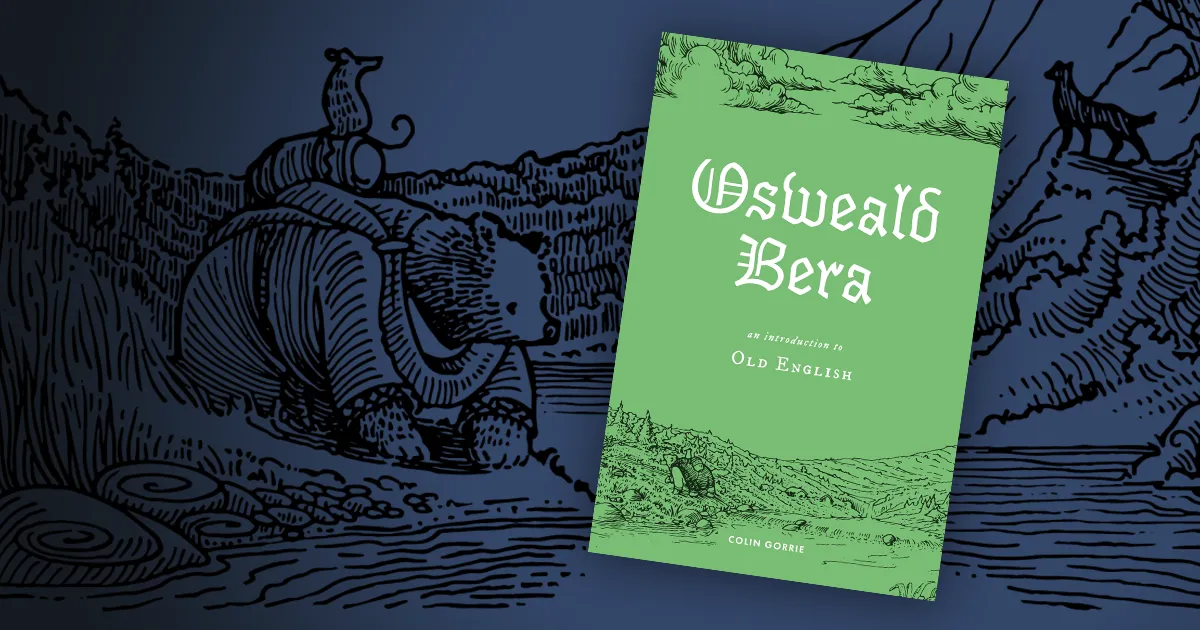The following text is lightly adapted from Sweet's reader,1 a collection of Old English texts for learners now in the public domain. This is one of the easiest texts in that collection and is a good place to start for students of Old English who are interested in beginning to read.
As this is a beginner-level text, I have glossed all the words and all grammar points that might be tricky to a beginner. Happy reading!
Matthew 7:24–27
Today's reading is from the Gospel of Matthew.2 Here is the complete text.
Ǣlċ þǣra þe þās mīne word ġehȳrþ, and þā wyrcþ, biþ ġelīċ þām wīsan were, se his hūs ofer stān ġetimbrode. Þā cōm þǣr rēn and myċel flōd, and þǣr blēowon windas, and āhruron on þæt hūs, and hit nā ne fēoll: sōþlīċe hit wæs ofer stān ġetimbrod. And ǣlċ þǣra þe ġehȳrþ þās mīne word, and þā ne wyrcþ, se biþ ġelīċ þām dysiġan menn, þe ġetimbrode his hūs ofer sandċeosel. Þā rīnde hit, and þǣr cōm flōd, and blēowon windas, and āhruron on þæt hūs, and þæt hūs fēoll; and his hryre wæs myċel.
Let's break it down into more manageable parts.
Ǣlċ þǣra þe þās mīne word3 ġehȳrþ, and þā wyrcþ, biþ ġelīċ þām wīsan were,
Each of them that hears these words of mine, and works them, is like the wise man,
- ǣlċ each. Note that ǣlċ takes a genitive, just as its Present-Day English descendant each often takes of, e.g. each of them.
- þǣra of them. This is the genitive plural of the article se/þæt/sēo the. The genitive is required by ǣlċ each. It is often used, as it is here, as a weak demonstrative pronoun them.
- þe which, who, that. Marks a relative clause.
- þās the. This is the accusative plural of þes/þis/þēos this. It is accusative because it is agreeing with word words, the direct object of ġehȳrþ hears.
- mīne my. Accusative plural, agreeing with word words.
- word words. Accusative plural as it is the direct object of ġehȳrþ hears. Don't be fooled by the lack of ending: word is the same in the accusative singular and plural. You can tell word is plural here because of þās mīne.
- ġehȳrþ hears. 3rd person singular of ġehȳran to hear. The singular is used here because the true subject is ǣlċ each (one).
- and and.
- þā them. Accusative plural of se/þæt/sēo the, here being used as a weakly demonstrative pronoun, equivalent to them.
- wyrcþ works. 3rd person singular of wyrċan to make; to work; to do. A more idiomatic translation might be puts into practice.
- biþ is. 3rd person singular of bēon. Bēon is used to express general truths, which makes sense given the context: a parable.
- ġelīċ like. Note that ġelīċ requires a dative.
- þām the. Dative singular masculine of se/þæt/sēo the, agreeing with were man.
- wīsan wise. Dative singular weak form of wīs wise. Dative because it agrees with were man. Weak because it follows the definite article.
- were man. Dative singular of wer man, as required by ġelīċ like.
se his hūs ofer stān ġetimbrode.4
who built his house on stone.
- se who. Here the definite article is being used as a relative pronoun, referring back to were man.
- his his.
- hūs house.
- ofer over, on. Here, governing the accusative.
- stān stone. Accusative singular, governed by ofer.
- ġetimbrode built. 3rd person singular past form of ġetimbran to build.
Þā cōm þǣr rēn and myċel flōd, and þǣr blēowon windas, and āhruron on þæt hūs, and hit nā ne fēoll:
Then there came rain and a great flood and there blew winds, and fell upon the house, and it did not fall down at all:
- þā then.
- cōm came. 3rd person singular past form of cuman to come.
- þǣr there. Here used existentially, as in the Present-Day English there is....
- rēn rain. Var. of reġn rain
- myċel great.
- flōd flowing waters; flood.
- blēowon blew. 3rd person plural past form of blāwan to blow.
- windas winds. Nominative plural of wind wind.
- āhruron fell. 3rd person plural past form of āhrēosan to fall (upon), attack.
- on upon, onto, into. Here taking the accusative case with a verb of motion āhrēosan to fall (upon).
- þæt the. Accusative singular neuter form of se/þæt/sēo.
- hūs house.
- hit it. Neuter because referring back to þæt hūs.
- nā ne not at all.
- fēoll fell down. 3rd person singular past form of feallan to fall (down).
sōþlīċe hit wæs ofer stān ġetimbrod.
For it was built on stone.
- sōþlīċe indeed, for, however
- wæs was. 3rd person singular past form of wesan to be.
- ġetimbrod built. Past participle of ġetimbran to build.
And ǣlċ þǣra þe ġehȳrþ þās mīne word, and þā ne wyrcþ, se biþ ġelīċ þām dysiġan menn, þe ġetimbrode his hūs ofer sandċeosel.
And each of them that hears these words of mine, and does not work them, he is like the foolish man, who built his house on sand.
- ne not.
- dysiġan foolish. Dative singular weak form of dysiġ foolish.5 Dative because it agrees with menn man. Weak because it follows the definite article.
- menn man. Dative singular of mann man (hence the umlaut-affected form menn), governed by ġelīċ like.6
- sandċeosel sand. Literally sand-gravel.
Þā rīnde hit, and þǣr cōm flōd, and blēowon windas, and āhruron on þæt hūs, and þæt hūs fēoll;
Then it rained and there came a flood and the winds blew, and rushed into the house, and the house fell;
- rīnde rained. 3rd person singular past form of rīnan, var. of riġnan to rain.
- hit it. This is the "dummy" or "pleonastic" it used in equivalent Present-Day English it rained.
and his hryre wæs myċel.
and its destruction was great.
- his its. Note that his can mean his or its, since it is the genitive singular form of both the masculine and neuter pronouns.
- hryre fall, ruin, destruction.
References
- Sweet, Henry (1879). An Anglo-Saxon Reader in Prose and Verse. Oxford: Clarendon.
Footnotes
-
Sweet (1879: 51). The adaptations include marking the palatal pronunciations of <g> and <c> using the over-dot notation: <ġ> and <ċ>, marking long vowels with a macron <ā> rather than an acute accent <á>, and marking the dental fricative with <þ>. ↩
-
The translation dates to the early 11th century but has been normalized for teaching purposes by Sweet (1879). ↩
-
þās mīne word. Lit. these my words. Unlike in most forms of Present-Day English, possessive pronouns and demonstratives can occur together. You can translate this idiomatically as these words of mine. ↩
-
ofer stān ġetimbrode. Usually ofer takes the accusative only with verbs of motion, with the meaning onto, across but here we have an exception. ↩
-
Dysiġ foolish gives us, after a semantic shift, the Present-Day English word dizzy. ↩
-
The primary sense of mann was person (i.e. a human being), but it could also refer more specifically to adult males as the modern form man has tended to do. Here I have glossed it as man because it is contrasting with wer man, and both are translating the Latin vir man. ↩

